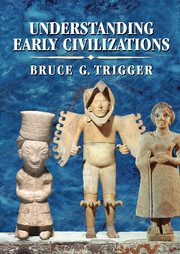Book contents
- Frontmatter
- Contents
- List of Illustrations
- Preface
- Understanding early civilizations
- Introduction
- Sociopolitical organization
- Economy
- 14 Food Production
- 15 Land Ownership
- 16 Trade and Craft Specialization
- 17 Appropriation of Wealth
- 18 Economic Constants and Variables
- Cognitive and symbolic aspects
- Discussion
- References
- Index
16 - Trade and Craft Specialization
Published online by Cambridge University Press: 05 June 2014
- Frontmatter
- Contents
- List of Illustrations
- Preface
- Understanding early civilizations
- Introduction
- Sociopolitical organization
- Economy
- 14 Food Production
- 15 Land Ownership
- 16 Trade and Craft Specialization
- 17 Appropriation of Wealth
- 18 Economic Constants and Variables
- Cognitive and symbolic aspects
- Discussion
- References
- Index
Summary
Evolutionary archaeologists used to believe that increasing social complexity and intellectual progress resulted primarily from the development of more complex technology, in particular increasing dependence on metallurgy. This view rested on the assumption that in early civilizations metal was used primarily to manufacture cutting tools. Yet it has long been recognized that the development of metallurgy was not as crucial to the evolution of various early civilizations as this view suggested (Childe 1951: 26–27).
The Yoruba were the only civilization in our sample that forged iron on a large scale. It is generally believed that, because of its greater technical complexity, iron forging began much later than the working of gold, silver, and copper. It has also been assumed that knowledge of how to work iron spread to Africa from the Middle East during the first millennium b.c. Nevertheless, radiocarbon dates which indicate that iron-working was well established as early as 700 b.c. in Uganda and West Africa and may have been practised there in the preceding millennium raise the possibility of the independent invention of iron-working in sub-Saharan Africa. The use of iron appears to have reached southern Nigeria early in the Christian era (Connah 1987: 113, 141; Holl 2000: 14–15; Shaw 1978: 69–99). Raw materials needed to make iron, in the form of laterites and iron-rich shale soils, were abundant in Yoruba territory, although they were more common in the north than in the south (Ojo 1966a: 96–98; Peel 1983: 22–23).
- Type
- Chapter
- Information
- Understanding Early CivilizationsA Comparative Study, pp. 338 - 374Publisher: Cambridge University PressPrint publication year: 2003



